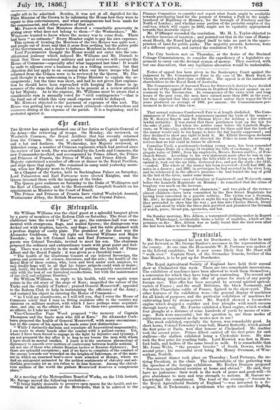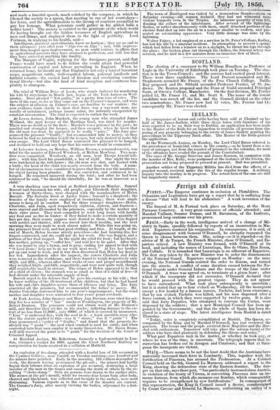Vrouiurial.
Mr. Sturt has resigned his seat for Dorchester, in order that he may be put forward as Mr. George Bankes's successor in the representation of the county. At one time the Honourable W. B. Portman was spoken of as the Liberal candidate, but it now seems likely that Mr. Sturt will "walk over." .Captain Sturt, of the Grenadier Guards, brother of the late Member, is to be put up for Dorchester.
The Royal Agricultural Society of England have held their annual show at Chelmsford this week. There are two remarkable innovations. The exhibitors of machines have been allowed to work them themselves; a concession for which they have long been contending. The second and most striking innovation is the offer of prizes for stock of any purely foreign race. This offer has been accepted by several spirited agricul- turists of France ; and the small Bretonne, the black Normandy, and the white Charrolaize cattle of France, figured in the show-yard. The other features of the exhibition were—the general display of machines for all kinds of purposes, and the particular exhibition of machines for cultivating land by steam-power. Mr. Boyden showed a locomotive engine which dragged a scarifier and four ploughs with much success through heavy soil. Mr. Fowler exhibited a fixed engine, which worked four ploughs at a distance of some hundreds of yards by means of wire- rope. Both were successful ; but the question is, are these modes of cultivation as economical as the modes now in use ?
The stock exhibited, especially the horses, was remarkably good. In short horns, Colonel Towneley's roan bull, Master Butterfly, which gained the first prize at Paris, won that honour at Chelmsford. Mr. Ambler took the second prize. Prince Albert carried off the first prize for cart stallions—the stallion exhibited being a Clydesdale horse. He also took the first prize for yearling bulls. Lord Berwick was first in Here- ford bulls, and heifers of the same breed in milk. It is remarkable that Mr. Jonas Webb, "the premier breeder" of South Downs, took the second prize ; his successful rival being Mr. Henry Overman, of Wea- Benham, Norfolk. The annual dinner took place on Thursday ; Lord Portman, the re- tiring President, in the chair. The characteristic of the gathering was the speeches of the foreign exhibitors. Mr. Evelyn Denison proposed "Success to agricultural societies at home and abroad." He said, they have no jealousies : their work is the work of peace and good-will—to give abundance to men and true strength to nations. M. Gareau ac- knowledged the compliment. The toast of the evening—" Success to the Royal Agricultural Society of England "—was intrusted to a fo- reigner, M. de Trehonnais ; a gentleman who spoke excellent English, and made a fanciful speech, much relished by the company, in which he /*cued the society to a queen, that meeting to one of her court-days- , her levee, and the agriculturalists to the throng of courtiers assembled to pay her homage. What potentate could gather in his gilded halls a nobler band ? The society is entitled to the gratitude of the whole world for having brought out the hidden treasures of English agriculture in limn and things, and displayed them in the light of publicity. Lord Portman, in replying to his health, said—
Intelligent, practical agriculturists, know no horizon ; they see no end to their advances ; year after year "Alps rise on Alps" ; and, with improve- ment thus heaped upon improvement, no man could venture to affirm that in agricultural pursuits they have attained to perfection, and still less that they have arrived at anything like finality.
The Marquis of Vogde, replying for the foreigners present, said that France would have much to do before she could attain that powerful combination of capital and labour prevailing in England. When he returned home, he should say that England is not only a land of luxuriant crops, magnificent cattle, well-requited labour, paternal landlords and faithful tenants—the envied land of freedom and everlasting constitu- tional liberty—but also the land of kind reception and courteous hos- pitality to strangers.
The trial of William Dove of Leeds, who stands indicted for murdering his wife by strychnine in March last, began at the York Assizes on Wed- nesday. Dove pleaded "Not guilty," in a pretty firm tone of voice. The facts of the case, RO far as they came out on the Coroner's inquest, and were the subject of allusion in Palmer's case, are familiar to our readers : the new evidence tends chiefly to show that Dove was a wayward man, na- turally of unbalanced, perhaps insane mind, the infirmity exasperated by constant intoxication. The trial is expected to outlast the week.
At Lewes Assizes John Murdock, the young man who strangled James Welland, the aged keeper of the Hastings Gaol, was tried for murder. There was no doubt as to the facts : Murdock was a prisoner in the gaol ; he assailed and strangled the keeper, and then escaped ; when he knew that the old man was dead, he appeared to be really • sorry." The Jury pro- nounced the prisoner "Guilty," but recommended him to mercy, as they believed he had no intention to kill the keeper, but only desired to make his own escape. The Lord Chief Baron sentenced the prisoner to be hanged, and declined to hold out any hope that his sentence would be commuted.
At Leicester Assizes, on Monday, William Brown, a returned convict, was tried for the murder of Edward Woodcock, at Melton Mowbray. Two mur- ders were committed. Woodcock, an old man, kept Thorpe Arnold toll- gate; with him lived his grandchild, a boy of eight. One night the two were butchered in the toll-house ; the old man was shot, and hacked with a. knife ; the head of the child was nearly severed from the body. A num- ber of circumstances were considered to prove that Brown was the murderer ; his object having been plunder. He was convicted, and sentenced to be hanged. He remained unmoved during the trial ; and after he had been sentenced he said, "he should die cheerfully, for he was as innocent as a child."
A very shocking ease was tried at Bedford Assizes on Monday. Samuel Barrett and Susannah his wife, old people, and Elizabeth their daughter, a woman of thirty-three, were charged with the manslaughter of Helen Barrett. The Barrette lived at Apsley Guise ; Samuel is a shepherd; the females of the family were employed at hicemaking ; there were ample means to keep all in comfort. But the three younger daughters—Helen, Charlotte, and Julia, aged respectively eighteen, sixteen, and fourteen— were starved and ill-treated by the prisoners, especially by the mother and their elder sister. They were compelled to work long hours with hardly any food and no fire in winter: if they failed to make a certain quantity of lace per day, their scanty suppers were denied to them, they were flogged with nettles and thistles, filth was forced into their mouths, and the next morning they were made to work almost naked. While this was going on, the prisoners lived well, and had good clothing and fires. At length, at the end of March, Helen became utterly powerless—she had fainting-fits, her lingers contracted, and she could not do her work. She was flogged, and a portion of her food stopped. lathe night she cried for food; but her heart- less mother, getting up, "cuffed her," and told her to lie quiet. After that she was heard to sing a hymn, and to pray, ending her appeal to God with "0 Lord Jesus ! help me to do my work next week." At five her brother got up and went to work, and it was then discovered that Helen lay dead in her bed. Immediately after the inquest, the sisters Charlotte and Julia were removed to the workhouse, and there found to weigh respectively only 4611b. and 391b., whereas after three weeks of care and proper nourishment they weighed 6411b. and 541b. respectively, and were now quite well, though still remarkably small in stature. The corpse of Helen appeared to be that of a child of eleven ,• the stomach was as small as that of a child of five—it had shrunk under the miserable supply of food. Barrett urged in his defence that he gave his earnings to his wife ; that he knew nothing of the ill-treatment of his children, but that he had heard his wife and elder daughter accuse them of idleness and lying. The Jury convicted all the prisoners but recommended the father to mercy. Mr. Justice Coleridge sentenced to one year's imprisonment ; but the cruel mother and daughter were sentenced to lour years' penal servitude.
At York Assizes, John Spencer and Mary Ann Davison were tried for set- ting fire to a number of " line " stacks at Pocklington, the property of Mr. Robert Denison. The prisoners could not obtain work at Mr. Denison's mill, and therefore they set fire to his stacks; inflicting damage to the ex- tent of no less than 11,000/., only 8000/. of which is covered by insurances. " Line" is undressed flax, with the seed in it : a legal guestion arose whe- ther the statute applied to this—was it "straw," was it " grain " ? The Jury pronounced a verdict of "Guilty," and found that the property de- stroyed was " grain" : the seed when crushed is used for cattle, and when converted into flour men employ it to make linseed-tea. Mr. Baron Bram- well still reserved the point as to "grain" for the decision of the Court of Criminal Appeal.
At Hertford Assizes, Mr. Robertson formerly a lead-merchant in Lon- don, obtained a verdict for 600/. against the Great Northern Railway as compensation for hurts received in a collision at Hatfield.
- An explosion of fire-damp attended with a fearful loss of life occurred in the Cymmer Colliery, near Cardiff, on Tuesday morning—one hundred and len miners have perished. Early in the morning, 116 colliers descended to -work, the firemen having pronounced the pit safe; the miners had hardly begun their labours when an explosion of gas occurred, destroying a large number of the men in the flames and causing the death of others by the re- sulting "choke-damp." Only six persons were drawn to the surface alive. The scenes at the pit's mouth, while for twenty-four hours body after body, charred and blackened, was collected and brought to the surface, were most distressing. Various reports as to the cause of the disaster are current. The Coroner's Jury, after merely viewing the bodies, adjourned for a fort- night.
The town of Hartlepool was visited by a tremendous thunder-storm on Saturday evening—old seamen declared, they had not witnessed more violent tempests even in the Tropics. An immense quantity of rain fell, flooding the cellars of the inhabitants. After several of the lightning_ flashes, or rather simultaneously with them, small detached portions of the electric fluid shot up into the air in a manner similar to rockets, and pre- sented an astonishing appearance. Very little damage was done by the lightning.
Walter Fairev, a lad employed as a servitor in St. Peter's College, Radky, has lost his life by a singular accident. In attempting to recover a sponge which had fallen from a window on to a skylight, he thrust his legs through the gless ; the broken glass cut through his clothes, the femoral artery was severed, and he died in a few minutes from an immense flow of blood.



























 Previous page
Previous page